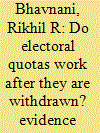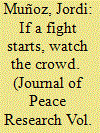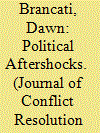|
|
|
Sort Order |
|
|
|
Items / Page
|
|
|
|
|
|
|
| Srl | Item |
| 1 |
ID:
150617


|
|
|
|
|
| Summary/Abstract |
European energy markets have undergone a major transformation as they have advanced towards market liberalisation and it is vital that the details of these developments be carefully examined. The success of liberalisation is based on smart regulation, which has been capable of providing solutions to unforeseen events in the process. Our paper seeks to contribute to existing understanding of the unexpected and collateral effects of the liberalisation process in the power system by examining a natural experiment that occurred in Spain in 2009. In that year, the electricity supply by distribution system operators disappeared. This change in retail market competition, as we demonstrate in this paper, has had an unexpected effect in terms of the system’s balancing requirements. We undertake a rigorous assessment of the economic consequences of this policy change for the whole system, in terms of its impact on final electricity prices.
|
|
|
|
|
|
|
|
|
|
|
|
|
|
|
|
| 2 |
ID:
100267


|
|
|
|
|
| Publication |
2010.
|
| Summary/Abstract |
We explore in this article an institutional foundation of agricultural protectionism in Japan, a country long recognized as resisting international pressures to open up its rice market. Using our qualitative analysis of postwar politics of agricultural protectionism and a simple formal model, we argue that farmers in Japan have stronger incentives to mobilize electoral support for the governing party in multimember district systems than in single-member district systems, because the marginal effects of mobilization on policy benefits are different under these electoral systems. Our empirical findings corroborate this claim and provide implications for the gradual changes in Japan's farm policies occurring after the electoral reform in 1994.
|
|
|
|
|
|
|
|
|
|
|
|
|
|
|
|
| 3 |
ID:
090824


|
|
|
|
|
| Publication |
2009.
|
| Summary/Abstract |
Do electoral quotas for women alter women's chances of winning elections after they are withdrawn? I answer this question by examining an unusual natural experiment in India in which randomly chosen seats in local legislatures are set aside for women for one election at a time. Using data from Mumbai, I find that the probability of a woman winning office conditional on the constituency being reserved for women in the previous election is approximately five times the probability of a woman winning office if the constituency had not been reserved for women. I also explore tentative evidence on the mechanisms by which reservations affect women's ability to win elections. The data suggest that reservations work in part by introducing into politics women who are able to win elections after reservations are withdrawn and by allowing parties to learn that women can win elections.
|
|
|
|
|
|
|
|
|
|
|
|
|
|
|
|
| 4 |
ID:
167277


|
|
|
|
|
| Summary/Abstract |
Social movements often face tactic diversification. In otherwise nonviolent movements, some groups or radical flanks may resort to violent actions such as street rioting. This article analyzes the impact that these violent episodes can have on popular support for the movement as a whole. To estimate the causal effect of violence, it exploits an unexpected riot outbreak that occurred during the fieldwork of a face-to-face survey in Barcelona in May 2016, led by a squat group linked to the anti-austerity movement known as the 15-M or indignados that emerged during the financial crisis. By comparing respondents interviewed before and after the riots, it finds that the street violence episode reduced support for the 15-M movement by 12 percentage points on average. However, the magnitude of the effect is highly conditional on the respondents’ predispositions towards the movement. Core supporters, that are expected to share the frame of the movement in justifying violent actions, are the least affected by the violent outbreak. On the other extreme, weak supporters, opposers, and non-aligned citizens reduce their support to a larger extent. Results are robust to different specifications and a wide range of robustness checks. These findings have potentially important implications for movements concerned with broadening their support base.
|
|
|
|
|
|
|
|
|
|
|
|
|
|
|
|
| 5 |
ID:
079525


|
|
|
|
|
| Publication |
2007.
|
| Summary/Abstract |
Although many scholars, policy makers, and relief organizations suggest that natural disasters bring groups together and dampen conflicts, earthquakes can actually stimulate intrastate conflict by producing scarcities in basic resources, particularly in developing countries where the competition for scarce resources is most intense. Capitalizing on a natural experiment design, this study examines the impact of earthquakes on intrastate conflict through a statistical analysis of 185 countries over the period from 1975 to 2002. The analysis indicates that earthquakes not only increase the likelihood of conflict, but that their effects are greater for higher magnitude earthquakes striking more densely populated areas of countries with lower gross domestic products as well as preexisting conflicts. These results suggest that disaster recovery efforts must pay greater attention to the conflict-producing potential of earthquakes and undertake certain measures, including strengthening security procedures, to prevent this outcome from occurring
|
|
|
|
|
|
|
|
|
|
|
|
|
|
|
|
| 6 |
ID:
138829


|
|
|
|
|
| Summary/Abstract |
Formal models of revolutionary collective action suggest that ‘informational cascades’ play a crucial role in overcoming collective action problems. These models highlight how information about the aggregate level of participation in collective action conveys information about others’ political preferences, and how such informational cues allow potential participants to update their beliefs about the value of participating in antiregime collective action. In authoritarian regimes, foreign mass media are often the only credible source of information about antiregime protests. However, limited robust evidence exists on whether foreign media can indeed serve as a coordination device for collective action. This article makes use of a detailed dataset on protest events during the 1989 East German revolution and exploits the fact that West German television broadcasts could be received in most but not all parts of East Germany. Across a wide range of Cox proportional hazards models and conditional on a rich set of observables, it finds that the availability of West German television did not affect the probability of protest events occurring. The evidence presented here does not support the widely accepted ‘fact’ that West German television served as a coordination device for antiregime protests during the East German revolution. More broadly, it also calls into question strong claims about the effects of communication technology on revolutionary collective action.
|
|
|
|
|
|
|
|
|
|
|
|
|
|
|
|
|
|
|
|
|